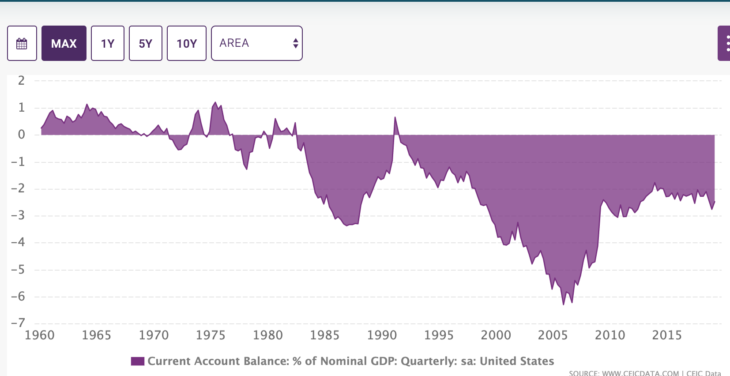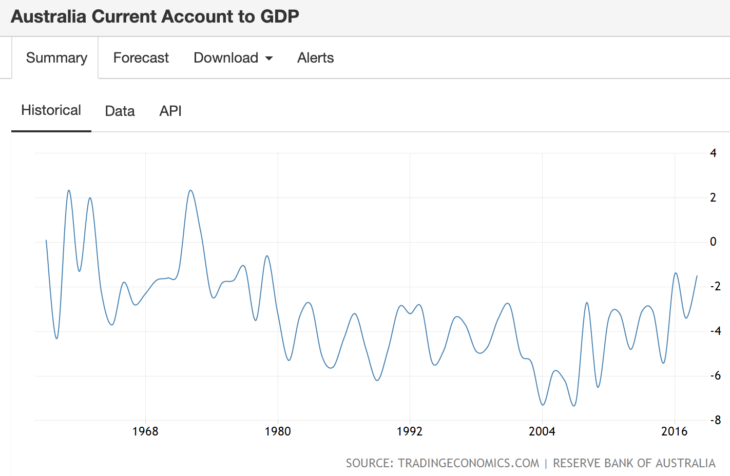
The euro is used throughout most of Europe. Thus you’d naturally expect Europe’s financial center to be located in a country that uses the euro. But that’s not the case; the “Wall Street” of Europe is in “the City”, the term for London’s financial district. That’s as weird as if North America’s major financial center were located in Toronto. It seems like having a universally accepted language to do business deals (English) is more important than having a common currency.
I wonder is something similar is true for capital flows. David Beckworth expresses a popular view in a recent National Review article:
The world needs dollars to buy safe assets from the United States. This, combined with the reserve-currency role held by the dollar, raises demand for the dollar, making it more expensive. As long as the U.S. remains the main supplier of safe assets to the world, the dollar will continue to be relatively pricey, and the U.S. will probably continue to run trade deficits.
That seems reasonable, and I believe there is some truth in that claim. Nonetheless, I suspect that the English language is an even more powerful factor. Here is the US current account balance as a share of GDP:

Since 1983, the deficit seems to have averaged about 3% of GDP. And here’s Australia:
 A slightly larger deficit than in the US, on average, although this year their deficit is expected to shrink to only 0.4% of GDP.
A slightly larger deficit than in the US, on average, although this year their deficit is expected to shrink to only 0.4% of GDP.
From various sources, I found that Canada’s current account deficit is expected to be 2.6% of GDP in 2019, vs. 2.4% in the US. New Zealand is expected to have a 3.6% deficit, while the UK expects a 4.1% deficit, “despite” the very weak pound sterling. (I use scare quotes for the term ‘despite’, as a reminder that we should not be reasoning from a price change. The US has a completely “normal” CA balance for English-speaking countries, indeed surprisingly small if one accounts for our huge budget deficit.
You might wonder if these deficits reflect the fact that English-speaking countries are rich, and can’t compete with low wage places like China and Mexico and Vietnam. Nope, the world’s biggest current account surpluses are mostly in other rich places like the Netherlands (9.7% of GDP), Switzerland (9.6% of GDP), Singapore (15.8% of GDP), Denmark (6.8% of GDP), Norway (7.1% of GDP) and Germany (6.5% of GDP.) High wages do not cause CA deficits.
So why do the English-speaking countries have persistent CA deficits? I suspect it has something to do with the fact that English-speaking places are an attractive location for immigration and investment. Immigrants to Australia who take out a mortgage and buy a house are contributing to their current account deficit. Chinese buyers who invest in homes in LA or Vancouver tend to create deficits for the US and Canada.
That’s not to say the dollar’s role as a reserve currency plays no role in our deficit. As an analogy, most economists believe that budget deficits contribute to our current account deficit. I accept this claim, and have made that point in numerous blog posts. And yet, America had a relatively large current account deficit during 1999-2001, despite several consecutive years of budget surpluses. So just as the US dollar’s role as the world’s dominant reserve currency is not the whole story, neither are budget deficits the entire story.
In other words, it’s complicated.
PS. If you believe the US current account deficit is somehow hurting our economy, ask yourself whether the Australian CA deficit has been hurting their economy during the past 28 recession-free years.


READER COMMENTS
Kevin Erdmann
Aug 27 2019 at 4:08am
Playing devils advocate here, it seems like there could be any number of factors related to being enthusiastic descendants of British governance norms which would appear to correlate with language.
Benjamin Cole
Aug 27 2019 at 4:19am
It is complicated. Can a young married couple along the western coast of North America, in Australia, in London or Great Britain, buy a house?
Yes, this is also a result of property zoning. But property zoning has been ruled constitutional in the United States and appears to be chiseled into granite.
I doubt that running large chronic current-account trade deficits can actually benefit a nation in the long run, given prevailing and evidently permanent structural impediments in the domestic and international economies.
Ricardo did not ponder capital moving among nations, nor housing as a scarce and artificially limited yet necessary resource.
An interesting side thought… do developed nations pay their employee class enough to reproduce? Empirically, the answer lately is no. This shortage has been offset by immigration. That is, developed nations do not pay their employee class enough to reproduce, and offshore the cost of child-raising to lower-cost nations.
In a closed economy, this problem of non-reproduction of the employee class I think would solve itself due to labor shortages that boost wages and the lowered cost of housing from limited demand.
Japan will be a fascinating case study to watch. I wish I had a few more decades of life to see the cycle. I am not planning on dying soon but I am the same age as Scott Sumner and this may play out over decades and decades.
Scott Sumner
Aug 27 2019 at 7:56am
Kevin, Agreed, there could be many reasons for the correlation. But I suspect that language plays at least an indirect role.
Dylan
Aug 27 2019 at 12:00pm
The FT had a column a couple months ago about how after Brexit, the Netherlands will be the English speaking capital of Europe. Most Dutch people speak excellent almost native level English, and English is the default language in many offices. The Dutch have also been pretty open to immigration too. Not sure about the levels of foreign investment relative to their peers.
And of course there’s that other European country where English is the native language. Ireland is also projected to have an account surplus of 9.1% this year.
Scott Sumner
Aug 27 2019 at 7:11pm
Dylan, Good points. Of course Ireland is different in the sense that its economy is dominated by exports from multinational corporations seeking a tax friendly location.
I suspect that the City will continue to dominate in financial services, but Amsterdam is a possible alternative.
Ryan
Aug 27 2019 at 2:31pm
And what of Ireland? Or are the national accounts data too distorted by transfer pricing?
Philip L
Aug 27 2019 at 2:35pm
London being the center of capital markets is probably more a historical institution then a result of language. Or, said a different way, the CAD and the fact that English speaking countries are attractive for investment are both largely a result of the British Empire’s position as the preeminent world economic power up until WW2.
Scott Sumner
Aug 27 2019 at 7:12pm
Yes, there’s no doubt that the global dominance of English comes from the British Empire.
BRIAN R HORRIGAN
Aug 27 2019 at 4:41pm
Not quite. Ireland is English speaking. It used to run large CA deficits, in line with the pattern, but soon after the crisis, it has flipped to large CA surpluses.
On the other hand, you might have listed Jamaica as a CA deficit country.
And Barbados. And Grenada.
Does India count as English speaking? Runs a large CA deficit.
Hong Kong runs a CA surplus, and it speaks English, but does it count as an independent country any more?
Taylor Rule
Aug 27 2019 at 4:46pm
I think it’s plausible that English speaking countries are more likely to run an account deficit. However, Singapore is actually English speaking and has the largest surplus out of the rich nations you listed. I know Singaporeans are taught another language but business is conducted in English if I’m not mistaken.
IVV
Aug 27 2019 at 4:50pm
I’ve wondered if the best indicator for the robustness of a language isn’t the number of (native or nonnative) speakers, but the value of the commerce conducted in the language.
Danno
Aug 27 2019 at 5:43pm
For Australia, one needs to look at the details. From the 4 June 19 press release:
“The balance on goods and services surplus in the March quarter 2019 was $13,594 million, a rise of $4,753 million. Exports of goods and services rose $4,239 million (4 per cent) and imports of goods and services fell $514 million. The net primary income deficit widened by $1,192 million to $15,984 million in the March quarter 2019. (emphasis added).”
Australia has a trade surplus but pays more on imported capital than they earn on exported capital which results in the current account deficit.
Which is what the National Review article is stating, the capital surplus creates the current account deficit. It could be because of the rule of law, language, the global savings glut, etc.
For example I have read 3 different explanations linking the capital account surplus with the rise of housing prices prior to the great recession (sorry but I don’t have the citations in front of me). The first is that U.S policies created a demand for housing which lead to a demand for capital, thus importing more capital. The second was the global savings glut created a surplus in capital which went into the mortgage market and lower mortgage rates created a demand for housing. Third, people from outside our borders wanted to invest in the U.S. and did so through by investing in real estate.
With floating exchange rates, the current and capital/financial accounts have the opposite sign. So in all of these cases a positive capital surplus leads to a current account deficit. So why do the English speaking countries have current account deficits? The vast capital markets (or need for capital in Australia’s case) brings in more capital and leads to the current account deficit.
Mark Brady
Aug 27 2019 at 5:43pm
“Immigrants to Australia who take out a mortgage and buy a house are contributing to their current account deficit.” Please explicate.
Scott Sumner
Aug 27 2019 at 7:15pm
A new immigrant who builds new home will typically be investing more than they save. The CA deficit is domestic investment minus domestic saving.
Matthias Görgens
Aug 27 2019 at 6:17pm
Singapore is English speaking just as well..
Scott Sumner
Aug 27 2019 at 7:15pm
Yes, but there’s a lot of forced saving in Singapore.
Bruno
Aug 27 2019 at 6:26pm
I am curious to know, as a non-economist, why real estate investments by foreigners in Vancouver tend to create CA deficits in Canada? Thanks.
Thomas Sewell
Aug 28 2019 at 8:27pm
Follow the money and track what is counted in the CA deficit and I think you’ll discover your answer.
For someone to purchase real estate in Canada, they need to have money which will spend in Canada, but their purchase doesn’t leave Canada, so it doesn’t count as part of their “trade”. As a result, they need to sell something to Canada (to get the Canadian dollars), without an offsetting sale by a Canadian to get their cash back.
Ahmed Fares
Aug 29 2019 at 12:49am
The capital flows drive the trade flows.
When Chinese buyers wish to invest in Vancouver real estate, they go into the foreign exchange market and buy Canadian dollars which drives up the value of the Canadian dollar. A higher Canadian dollar leads to more imports and less exports, thus widening trade deficits.
Lorenzo from Oz
Aug 27 2019 at 10:33pm
In its entire history, there have been barely any years Australia did not have a Current Account Deficit. We import capital for obvious reasons. Population density is much lower in the persistent CAD Anglo countries, which does not contradict your point.
I am a Coasian. Transaction costs matter, and English has much lower transaction costs or, at least, much larger range of use.
London was the first great modern capital market and has a lot of institutional oomph behind. It does not have much of a competitor within Europe. Frankfurt has simply never been as broadly based. And yes, in part that is a legacy of Empire, but mostly it was England was where the technological growth revolution happened first.
Comments are closed.